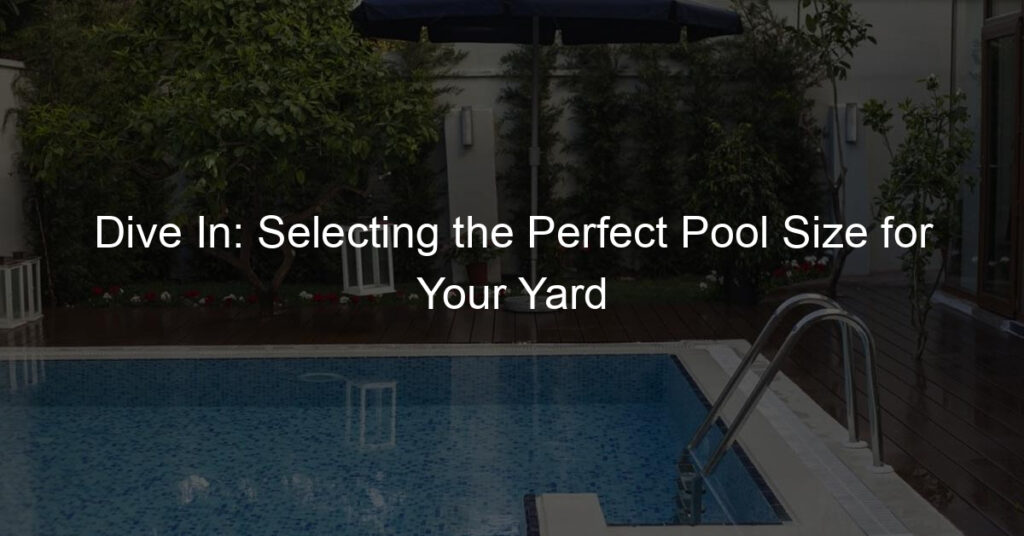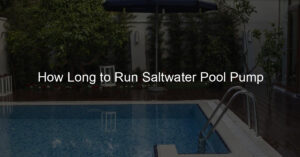Introduction: Choosing the Right Pool Size for Your Yard
When it comes to installing a swimming pool in your yard, one of the most critical decisions you’ll need to make is the pool’s size. The size of your pool can significantly impact how you and your family use it, the overall aesthetic of your yard, and even the value of your property. This guide will help you understand the importance of pool size selection and the factors to consider when choosing a pool size.
- Understanding the Importance of Pool Size Selection
- Factors to Consider When Choosing a Pool Size
Selecting the right pool size is not just about how much space you have in your yard. It’s about finding a balance between your needs, your budget, and your yard’s layout. A pool that’s too small might not meet your needs, while a pool that’s too large can overwhelm your yard and be more expensive to maintain. Therefore, understanding the importance of pool size selection is crucial to making an informed decision.
Several factors should influence your decision when choosing a pool size. These include the size and shape of your yard, how you plan to use the pool, your budget, and any local regulations or restrictions. For instance, if you have a small yard, you might need to opt for a smaller pool or a creative shape to make the most of your space. If you plan to use the pool for exercise, such as swimming laps, you’ll need a longer pool than if you’re primarily using it for leisure and relaxation. Your budget will also play a significant role, as larger pools are generally more expensive to install and maintain. Finally, be sure to check any local regulations or restrictions that might limit your pool’s size or placement.
In the following sections, we will delve deeper into these factors, providing a comprehensive pool size guide, tips on selecting pool size based on yard size, and other factors influencing pool size selection. By the end of this guide, you’ll have all the information you need to make the right pool size choice for your yard.
A Comprehensive Pool Size Guide
When it comes to selecting the perfect pool for your backyard, size matters. This guide will help you understand the different pool sizes and how to choose the right one for your backyard.
Understanding Backyard Pool Sizes
Backyard pools come in a variety of sizes, each with its own set of features and benefits. Let’s dive into the details.
- Standard pool sizes and their features
- Benefits of choosing the right size pool for your backyard
Standard pool sizes typically range from small (12 feet by 24 feet) to large (20 feet by 40 feet). Small pools are perfect for a quick dip or a small family, while larger pools provide more room for swimming and games. The features of these pools are largely determined by their size. For example, larger pools may include diving boards or slides, while smaller pools may be more focused on comfort and relaxation features like seating and jets.
Choosing the right size pool for your backyard can have several benefits. First, it ensures that the pool fits comfortably in your space without overwhelming it. This can enhance the overall aesthetic of your backyard. Second, it can improve the functionality of your pool. A pool that’s the right size for your backyard and your needs will be more enjoyable and easier to maintain. Lastly, it can increase the value of your home. A well-designed and appropriately-sized pool can be a selling point if you ever decide to move.
Understanding the standard sizes and the benefits of choosing the right size pool for your backyard is the first step in making an informed decision. Remember, the best pool for you is one that fits your space and meets your needs.
Custom Pool Sizes
While standard pool sizes are common, custom pool sizes offer a unique way to tailor your backyard oasis to your specific needs and preferences. Let’s explore the pros and cons of custom pool sizes, and look at some examples.
- Pros and Cons of Custom Pool Sizes
- Examples of Custom Pool Sizes
- Plunge Pool: These small, deep pools are perfect for small yards. They typically measure around 7 x 12 feet.
- Lap Pool: These long, narrow pools are designed for swimming laps. They’re typically about 10 x 40 feet.
- Resort-Style Pool: These large, luxurious pools can include features like a swim-up bar or a lazy river. The size can vary greatly depending on the features included.
Custom pool sizes come with a variety of benefits and drawbacks. Understanding these can help you make an informed decision about what’s best for your backyard.
| Pros | Cons |
|---|---|
| Flexibility: Custom pools can be designed to fit any yard size or shape. | Cost: Custom pools can be more expensive than standard sizes due to the additional design and construction work. |
| Uniqueness: A custom pool can be a standout feature in your yard, setting it apart from others. | Time: It may take longer to design and build a custom pool than a standard one. |
| Personalization: You can add features that cater to your specific needs, such as a shallow area for kids or a lap lane for exercise. | Resale Value: Not all homebuyers may appreciate a uniquely designed pool, which could affect your home’s resale value. |
Custom pool sizes can range from small plunge pools to large resort-style pools. Here are a few examples:
In conclusion, custom pool sizes offer a unique way to personalize your backyard. However, they require careful planning and consideration of factors such as cost and time. By understanding the pros and cons, you can make the best decision for your needs.
Selecting Pool Size Based on Yard Size
One of the most important factors to consider when choosing a pool for your yard is the size of your yard. The size of your yard will determine the size of the pool that you can install. In this section, we will discuss how to select the right pool size for a small yard.
Small Yard Pool Selection
Having a small yard doesn’t mean you can’t enjoy the luxury of a swimming pool. With the right planning and selection, you can have a pool that fits perfectly into your small yard.
- Best pool sizes for small yards
- Case study: Successful small yard pool installations
For small yards, smaller pools, typically between 10 to 15 feet in length and width, are ideal. These pools are large enough for relaxation and light swimming, but small enough to fit comfortably in your yard without taking up too much space. Remember, the pool should enhance your yard, not overwhelm it.
Let’s take a look at a successful case of a small yard pool installation. Mr. and Mrs. Smith, living in a suburban neighborhood, had a yard measuring 20×30 feet. They decided to install a pool of 12×15 feet. This left them with enough space for a small patio and garden area around the pool. The result was a well-balanced and aesthetically pleasing backyard where they could swim, relax, and entertain.
In conclusion, selecting the right pool size for a small yard involves careful planning and consideration of the available space. A well-chosen pool can transform your small yard into a relaxing oasis.
Large Yard Pool Selection
When you have a large yard, you have the luxury of choosing a larger pool. This section will discuss the advantages of having larger pools in larger yards and the key considerations when choosing a large pool.
- Advantages of Larger Pools in Larger Yards
- Key Considerations When Choosing a Large Pool
One of the biggest advantages of having a larger pool in a larger yard is the amount of space you have for swimming and other water activities. You can swim laps, play water games, or simply float around without feeling cramped. Plus, larger pools can accommodate more people, making them ideal for hosting pool parties or family gatherings.
Another advantage is the aesthetic appeal. A large pool can serve as a beautiful centerpiece in your yard, enhancing the overall look and feel of your outdoor space. It can also increase the value of your property, as many homebuyers appreciate the luxury of a large pool.
While a large pool can offer many benefits, there are also important considerations to keep in mind. One of the main considerations is the cost. Larger pools are more expensive to install, maintain, and heat. You’ll need to factor in the ongoing costs of cleaning, chemical balance, and potential repairs.
Another key consideration is the amount of yard space you want to dedicate to the pool. While a large pool can be a great feature, you also want to ensure you have enough yard space for other activities or landscaping features.
Lastly, consider the safety measures needed for a large pool. This might include fencing, pool covers, and alarms to prevent accidents, especially if you have children or pets.
In conclusion, a large pool can be a great addition to a large yard, offering ample space for swimming and entertainment. However, it’s important to consider the costs, space allocation, and safety measures when making your decision.
Other Factors Influencing Pool Size Selection
When choosing the size of your pool, there are several factors to consider. One of the most important is the purpose of the pool. Let’s delve into this.
Considering the Purpose of the Pool
The purpose of your pool plays a significant role in determining its size. Whether you’re planning to use it for exercise and sports or relaxation and entertainment, the size requirements can vary greatly.
- Pool size for exercise and sports: If you’re a fitness enthusiast or have a family that loves water sports, a larger pool might be necessary. For instance, a pool for swimming laps should ideally be at least 25 feet long. This allows for uninterrupted swimming and a better exercise experience. Similarly, if you’re planning to play water sports like water polo or volleyball, a larger and deeper pool would be more suitable.
- Pool size for relaxation and entertainment: If you envision your pool as a place for relaxation or for hosting parties, a smaller pool might suffice. A smaller pool can still provide a refreshing dip on a hot day and serve as the centerpiece for outdoor gatherings. For example, a plunge pool, typically 10 to 15 feet long, could be perfect for cooling off and socializing. Remember, it’s not always about the size, but how you plan to use the space.
In conclusion, the purpose of your pool should guide your decision on its size. Whether you want a pool for exercise, sports, relaxation, or entertainment, ensure it fits your needs and lifestyle. Stay tuned for more factors influencing pool size selection in the next section.
Considering the Budget
When planning for a pool, it’s crucial to consider your budget. The cost of a pool can vary greatly depending on its size. Let’s explore the cost implications of different pool sizes and how you can budget for your ideal pool size.
- Cost Implications of Different Pool Sizes
- How to Budget for Your Ideal Pool Size
The size of your pool directly impacts the cost. Larger pools require more materials and labor, which increases the overall cost. For instance, a small pool of about 10×20 feet might cost between $10,000 to $15,000. On the other hand, a larger pool of about 20×40 feet could cost upwards of $30,000. It’s also important to note that larger pools will have higher maintenance costs, including cleaning, heating, and repairs.
| Pool Size (feet) | Estimated Cost |
|---|---|
| 10×20 | $10,000 – $15,000 |
| 20×40 | $30,000+ |
Once you’ve determined your ideal pool size, it’s time to budget. Start by getting a quote from a reputable pool builder. This will give you a clear idea of the costs involved. Next, consider how much you can afford to spend upfront and how much you can afford in ongoing maintenance costs. Remember, it’s better to budget a little extra for unexpected expenses. Finally, consider financing options. Some pool builders offer financing plans, or you could consider a home equity loan.
In conclusion, considering your budget is a crucial step in selecting the right pool size. By understanding the cost implications of different pool sizes and planning your budget accordingly, you can ensure that your new pool is a source of enjoyment rather than financial stress.
Conclusion: Making the Right Pool Size Choice for Your Yard
Choosing the right pool size for your yard is not just about the space available. It’s about understanding your needs, preferences, and the various factors that can influence your decision. Let’s recap some of the key points we’ve discussed in this guide.
- Recap of key points in pool size selection:
- Final thoughts on choosing the perfect pool size for your yard:
Firstly, we discussed how to choose a pool size based on your yard size. We learned that it’s crucial to consider the overall layout of your yard, the space needed for pool equipment, and the area required for poolside activities.
Next, we delved into other factors that can influence your pool size selection. These include your budget, the intended use of the pool, the number of users, and local regulations.
Remember, the perfect pool size for your yard is one that meets your needs, fits your budget, and enhances the overall aesthetics of your outdoor space.
Ultimately, the decision on the perfect pool size for your yard is a personal one. It’s about finding a balance between what you want and what is practical. It’s about creating a space where you can relax, have fun, and make lasting memories.
Whether you choose a small, intimate pool or a large, family-sized one, the most important thing is that it serves its purpose and adds value to your home and lifestyle.
Remember, a pool is a significant investment. So, take your time, do your research, and make a well-informed decision. After all, the right pool size can transform your yard into your very own private oasis.














